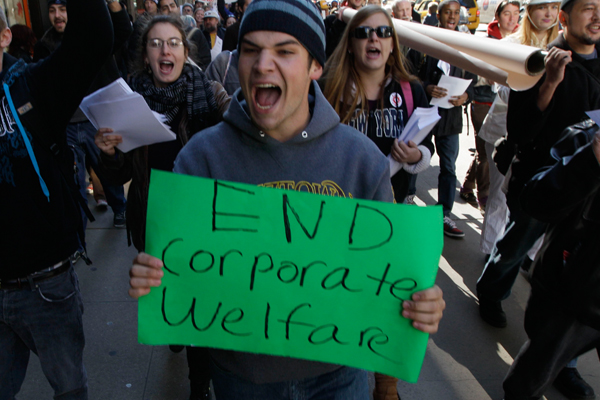 We already pay dearly for energy, medicine, banking, and telecommunications services. But a little research reveals that we’re paying more — much more — in a variety of ways that our business-friendly mainstream media won’t talk about.
We already pay dearly for energy, medicine, banking, and telecommunications services. But a little research reveals that we’re paying more — much more — in a variety of ways that our business-friendly mainstream media won’t talk about.
1. Drug Companies: The Body Snatchers
A report by Battelle Memorial Institute determined that the $4 billion government-funded Human Genome Project (HGP) will generate economic activity of about $140 for every dollar spent. Although that estimate is controversial, drug industry executives say it’s just a matter of time before the profits roll in.
Big business is quickly making its move. Celera Genomics was first, as the company initiated a private version of the genome project, incorporating the public data into their work, but forbidding the public effort to use Celera data. Abbott Labs is developing products based on the HGP. Merck’s automated biotechnology facility was made possible by the HGP. Two-thirds of the products at Bristol-Myers Squibb have been impacted by the HGP. Pfizer is starting to make big profits from its genome-based cancer treatments.
But the industry is going beyond profits, to the actual privatization of our bodies. One-fifth of the human genome is privately owned through patents. Strains of influenza and hepatitis have been claimed by corporate and university labs, preventing researchers from using the patented life forms to perform cancer research.
As if to mock us while taking over our public research, some of the largest drug companies haven’t been paying much in taxes. Pfizer had 40% of its 2011-12 revenues in the U.S., but declared almost $7 billion in U.S. losses to go along with $31 billion in foreign profits. Abbott Labs had 42% of its sales in the U.S., but declared a loss in the U.S. along with $12 billion in foreign profits.
2. Oil Companies: Ripping Up the Country, Ripping Off the Taxpayers
In the past year the U.S. has become a net exporter of oil, putting us in a position, according to the International Energy Agency, to be almost energy self-sufficient by 2035. Just five years ago we were spending $341 billion on crude oil imports. In 2012 we exported $117 billion worth of processed oil products.
How have the big oil companies reimbursed America for our oil and natural gas supplies, and for their pollution and the environmental degradation of mining and fracking? Exxon, with 70-90% of its productive oil and gas wells in the U.S., declares only 15% of its income as earned here, and pays only 2.2% of its total income in U.S. taxes. Chevron has about 75% of its oil and gas wells and 90% of its pipeline mileage are in the United States, yet the company claims only 20% of its income in the U.S., and pays only 3.8% of its total income in U.S. taxes.
3. Telecommunications: We’re Paying Them to Spy on Us
The CIA and NSA have been using our tax money to pay AT&T and Google and other companies to access its data – our data – for surveillance purposes. With almost no transparency or oversight, the CIA has been paying AT&T to monitor our overseas phone calls. Hundreds of dollars per customer per month goes toVerizon for similar snooping. The NSA compensated Google, Yahoo, Microsoft and Facebook for penalties accrued in the secretive Prism surveillance program.
As with the oil companies, tax avoidance by the telecommunications firms further insults middle-class Americans. AT&T paid almost no federal income taxes in 2011-12; Verizon paid about 2 percent; Google is notorious for its tax avoidance schemes.
4. Banks: Almost 40% of Our 401(k)s Lost in Fees
Based on the 6% historical stock market return, an individual investing $1,000 a year for 30 years in a non-fee fund and then holding the accumulated sum for another 20 years would end up with $269,000. Imposing the industry average 1.3% fee would reduce the final total to $165,000, a 39% reduction.
In other words, almost $2 of every $5 in potential 401(k) earnings is lost because of bank fees.
The importance of preserving Social Security becomes even more apparent in light of this 401(k) exploitation. Since 1983, the number of private sector workers depending on a 401(k) instead of a company pension has increased from 12 percent to 68 percent.
5. Banks II: Revenue Here, Profits Overseas
Bank of America CEO Brian Moynihan once lamented that nobody understood “how much good” his employees do. But his company, despite making a whopping 82% of its 2011-12 revenue in the U.S., declared a $10 billion profit in foreign countries — and $7 billion in U.S. losses.
Citigroup isn’t much better. The company had 42% of its 2011-12 revenue in North America (almost all U.S.) but declared a $28 billion profit in foreign countries, and a $5 billion U.S. loss.

